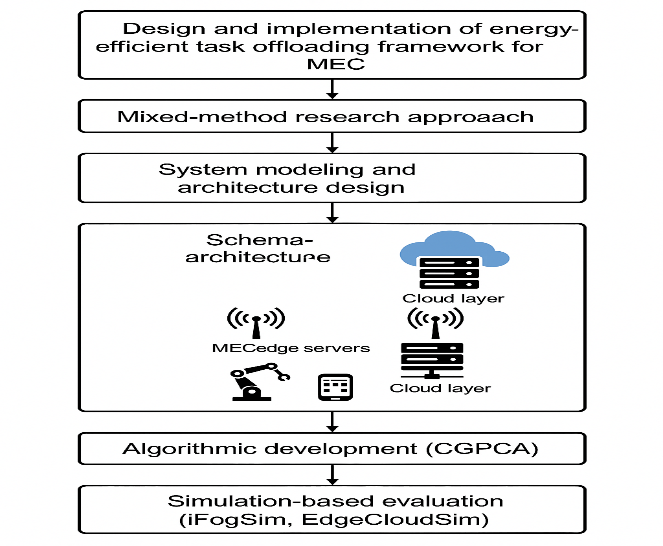Industry 5.0: An Energy-Efficient Smart Task Offloading Mechanism for Multi-Access Edge Computing
Keywords:
Genetic Algorithm, Industrial Internet of Things, Industry 5.0, Latency Optimization, Multi-Access Edge Computing (MEC), Particle Swarm Optimization, Task OffloadingAbstract
The industry 5.0 heralds a transformation of industrial systems by integrating artificial intelligence (AI), the Industrial Internet of Things (IIoT), and Multi-Access Edge Computing (MEC) to foster resilience, efficiency, and sustainability. However, managing the massive volume of computation-intensive tasks generated by heterogeneous IIoT devices presents major challenges, particularly in optimizing both latency and energy consumption under dynamic industrial conditions. This research proposes a hybrid task offloading framework Computational Genetic Particle Swarm Optimization Algorithm (CGPCA) to intelligently balance energy efficiency and latency in MEC-enabled IIoT networks. CGPCA integrates the global search capability of Genetic Algorithms (GA) with the fast convergence of Particle Swarm Optimization (PSO), forming a two-layer optimization approach for effective task-device associations and power-bandwidth allocation. The framework is evaluated using iFogSim and Edgelands simulation environments, reflecting realistic industrial scenarios with variable workloads, device capabilities, and server conditions. Results indicate that CGPCA reduces average latency by up to 24%, lowers energy consumption by 18–25%, and maintains a task offloading success rate of 94% surpassing conventional GA, PSO, and heuristic baselines. The framework also achieves improved load balancing and faster convergence time, confirming its suitability for time-sensitive and energy-constrained IIoT environments. This study contributes to the realization of Industry 5.0 by offering an adaptive, intelligent solution that enhances computational efficiency while supporting sustainable and human-centered industrial automation. Future directions include extending CGPCA to highly mobile IIoT contexts and integrating predictive analytics for further performance gains.
References
D. B. Paula Fraga-Lamas, “Mist and Edge Computing Cyber-Physical Human-Centered Systems for Industry 5.0: A Cost-Effective IoT Thermal Imaging Safety System,” Sensors, vol. 22, no. 21, p. 8500, 2022, doi: https://doi.org/10.3390/s22218500.
M. Sharma, A. Tomar, and A. Hazra, “Edge Computing for Industry 5.0: Fundamental, Applications, and Research Challenges,” IEEE Internet Things J., vol. 11, no. 11, pp. 19070–19093, Jun. 2024, doi: 10.1109/JIOT.2024.3359297.
Q.-L. H. and Y. T. J. Xu, Q. Sun, “When Embodied AI Meets Industry 5.0: Human-Centered Smart Manufacturing,” IEEE/CAA J. Autom. Sin., vol. 12, no. 3, pp. 485–501, 2025, doi: 10.1109/JAS.2025.125327.
T. M. F.-C. and P. Fraga-Lamas, “Forging the Industrial Metaverse for Industry 5.0: Where Extended Reality, IIoT, Opportunistic Edge Computing, and Digital Twins Meet,” IEEE Access, vol. 12, pp. 95778–95819, 2024, doi: 10.1109/ACCESS.2024.3422109.
B. Mali, A. Hazra, N. Mazumdar, and M. Gurusamy, “Edge Computing for Latency-Critical Task Offloading in Industry 5.0,” IEEE Sensors Lett., vol. 8, no. 4, pp. 1–4, Apr. 2024, doi: 10.1109/LSENS.2024.3379832.
L. N. Saad Aljubayrin, Ghadah Aldehim, Nuha Alruwais, Khalid Mahmood, Mesfer Al Duhayyim, Hong Min, “Dynamic offloading strategy for computational energy efficiency of wireless power transfer based MEC networks in industry 5.0,” J. King Saud Univ. - Comput. Inf. Sci., vol. 35, no. 10, p. 101841, 2023, doi: https://doi.org/10.1016/j.jksuci.2023.101841.
C. Xu, “Energy Consumption and Time-Delay Optimization of Dependency-Aware Tasks Offloading for Industry 5.0 Applications,” IEEE Trans. Consum. Electron., vol. 7, no. 1, pp. 1590–1600, 2024, doi: 10.1109/TCE.2023.3338620.
S. Pal, “Artificial Intelligence-Based IoT-Edge Environment for Industry 5.0,” Internet of Things, vol. Part F2947, pp. 111–148, 2024, doi: 10.1007/978-3-031-58388-9_4.
Yu Sun, Qijie He, “Computational Offloading for MEC Networks with Energy Harvesting: A Hierarchical Multi-Agent Reinforcement Learning Approach,” Electronics, vol. 12, no. 6, p. 1304, 2023, doi: https://doi.org/10.3390/electronics12061304.
C. Z. Shuangjuan Li, “Energy-Efficient Task Offloading in Wireless-Powered MEC: A Dynamic and Cooperative Approach,” Mathematics, 2024, [Online]. Available: http://preprints.org/manuscript/202407.0056/v1
J. J. Ling Hou, Shi Li, , Zhishu Shen, , Jing Fu, , Jingjin Wu, “Energy Efficient Offloading Policies in Multi-Access Edge Computing Systems with Task Handover,” arXiv:2306.15185v3, 2024, [Online]. Available: https://arxiv.org/html/2306.15185v3
Y. Deng and H. Sun, “Joint Computation Offloading and Task Caching Strategy for MEC-Enabled IIoT,” Lect. Notes Comput. Sci. (including Subser. Lect. Notes Artif. Intell. Lect. Notes Bioinformatics), vol. 14879 LNAI, pp. 349–361, 2024, doi: 10.1007/978-981-97-5675-9_30.
X. S. Wenzao Li, “A hybrid GA-PSO strategy for computing task offloading towards MES scenarios,” PeerJ Comput. Sci., vol. 9, p. e1273, 2023, doi: 10.7717/peerj-cs.1273.
S. T. Hafiz Hasnain Imtiaz, “Multi-Task Partial Offloading with Relay and Adaptive Bandwidth Allocation for the MEC-Assisted IoT,” Sensors, vol. 23, no. 1, p. 190, 2023, doi: https://doi.org/10.3390/s23010190.
P. F. Moshiri, M. Simsek, and B. Kantarci, “Partitioned Task Offloading for Low-Latency and Reliable Task Completion in 5G MEC,” 2025 IEEE Int. Conf. Commun. Work. (ICC Work., pp. 560–565, Jun. 2025, doi: 10.1109/ICCWORKSHOPS67674.2025.11162328.
H. M. Birhanie and M. O. Adem, “Optimized task offloading strategy in IoT edge computing network,” J. King Saud Univ. - Comput. Inf. Sci., vol. 36, no. 2, p. 101942, 2024, doi: https://doi.org/10.1016/j.jksuci.2024.101942.
M. Y. Khoi Anh Bui, “Interruption-Aware Computation Offloading in the Industrial Internet of Things,” Sensors, vol. 25, no. 9, p. 2904, 2025, doi: https://doi.org/10.3390/s25092904.
N. Fatima, P. Saxena, and M. Gupta, “Integration of multi access edge computing with unmanned aerial vehicles: Current techniques, open issues and research directions,” Phys. Commun., vol. 52, p. 101641, 2022, doi: https://doi.org/10.1016/j.phycom.2022.101641.
S. I. L. Paula Fraga-Lamas, “Green IoT and Edge AI as Key Technological Enablers for a Sustainable Digital Transition towards a Smart Circular Economy: An Industry 5.0 Use Case,” Sensors, vol. 21, no. 17, p. 5745, 2021, doi: https://doi.org/10.3390/s21175745.
T. N. Samah A. Zakaryia, Mohamed Meaad, “Task offloading and resource allocation for multi-UAV asset edge computing with multi-agent deep reinforcement learning,” Computing, vol. 107, no. 126, 2025, doi: https://doi.org/10.1007/s00607-025-01472-5.

Downloads
Published
How to Cite
Issue
Section
License
Copyright (c) 2025 50sea

This work is licensed under a Creative Commons Attribution 4.0 International License.




















